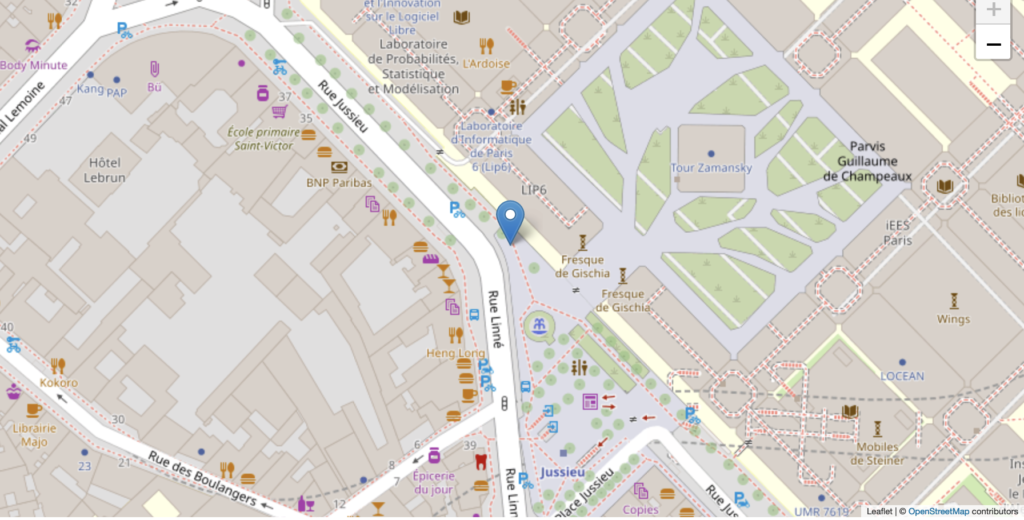
The 2025 GDAP Meeting will be held at:
Sorbonne Université –
Pierre and Marie Curie Campus (UPMC)
Tower 45-55 – IPSL Seminar room (2nd Floor)
4 place Jussieu
75005 Paris
France

Access:
To book your accommodation, you can either contact the hotels below, all located near the Venue, or use the Convention and Visitors Bureau facilities, or one of your own preferred accommodation booking method.
Hotels in the area:
Paris Art Hotel Quartier Latin
1, rue des Ecoles, 75005 Paris
Familia Hotel
11 rue des Ecoles, 75005 Paris
Best Western Plus Quartier Latin Panthéon
71 rue Monge, 75005 Paris
Hotel du Jardin des Plantes
5 rue Linné, 75005 Paris
Hotel Vendome Saint-Germain
8 rue d’Arras, 75005 Paris
Hotel des Arènes
51 rue Monge, 75005 Paris
Hotel des Nations Saint Germain
54 rue Monge, 75005 Paris
Getting to Paris by air
Paris has two international airports, Paris-Charles de Gaulle (CDG) (23km north of Paris) and Paris-Orly (14km south of Paris) (ORY). The latest information on travel formalities and documents to Paris by air can be found here.
From Charles de Gaulle airport (CDG) or Orly airport you can travel to the city centre of Paris by train, bus or taxi.
For information and to book a ticket from CDG to Paris go to https://www.welcomepickups.com/paris/charles-de-gaulle-airport-to-city/.
For information and to book a ticket from Orly Airport to Paris go to https://www.welcomepickups.com/paris/orly-airport-to-city/.
Getting to Paris by train
There are six Paris train stations, or gares, taking passengers from and to destinations throughout France and the rest of Europe — Gare du Nord, Gare de l’Est, Gare de Lyon, Gare d’Austerlitz, Gare Montparnasse, Gare Saint-Lazare. If you want to travel to Paris by train click here to find suitable options.
Transportation in Paris
The Paris public transport system is run by RATP and consists of the Métro (underground), Tram, RER suburban express train (which interconnects with the Métro inside Paris), bus and Noctilien (night bus). Paris and its surburbs divide into 6 zones. Zones 1 and 2 cover the city center and ALL Métro lines.
RATP tickets and passes are valid on the Métro, tram, buses and RER. The Métro alone is very efficient and will take you anywhere you need to go within Paris city limits, and sometimes slightly beyond. Buses are less reliable but still offer a good service.
The Paris Metro is very easy to use and, given the traffic congestion in Paris, is often much faster than taking a taxi. The various lines are numbered and color-coded. You need to identify the number of the line and name of the station at the end of the line in the direction you wish to go so that you know which way to go in the station.
The Paris Visite Pass is valid for either 1, 2, 3 or 5 days’ unlimited use on all RATP services (Métro, suburban trains, trams, buses, etc.). Fares vary according to number of days and travel zones selected. For more information on transportation, tickets and passes in Paris click here. RATP offers maps for the metro, RER, tram and bus lines that make up the Paris transport network. They are interactive and downloadable in PDF format. Everything you need to know to plan your visit to Paris is available here.
France is part of the Schengen Area. Residents of certain countries must apply for a visa in their home country before entering France. With the Visa Wizard you can easily check whether this applies to you or not. Click here to acces the Visa Wizard.
Paris is the capital and most populous city of France, with an estimated population of 2,16 million residents (Jan. 2019). Since the 17th century, Paris has been one of the world’s major centers of finance, diplomacy, commerce, fashion, gastronomy, science, and arts. Paris is especially known for its museums and architectural landmarks like the Louvre Museum, noted for their collections of French Impressionist art and home to some of the best-known works of arts, including the Mona Lisa and the Venus of Milo, Centre Pompidou with a large collection of modern and contemporary art.
Other well known attractions in Paris include the Eiffel Tower, Arc de Triomphe and the Cathedral of Notre Dame.
Each of Paris’s neighborhoods has its own characteristics and dynamics, from the village of Montmartre, to the Latin Quarter, through to the cradle of the Île de la Cité.
For more information on Paris and things to do, visit Explore France and Paris, the official website of the Convention and Visitors Bureau.

Pharmacies can be identified by a Green Cross.
Medical emergency: dial 15
Police: dial 17
Fire department (fires, accidents, emergency): dial 18
As in any large city, be aware of situations where pickpockets may be a problem, especially in crowded places like some of the major subway stations. In general, Paris is a safe city.
All attendees and participants are expected to conduct themselves with integrity and in a manner that is professional, respectful, tolerant and responsible. A zero-tolerance approach will be applied to any form of discrimination or harassment, including but not limited to sexual harassment and bullying.
Discrimination is any unfair treatment or arbitrary distinction based on a person’s race, religion, nationality, ethnic origin, sexual orientation, disability, age, language, social origin or other status. Discrimination may be an isolated event affecting one person or a group of persons similarly situated or may manifest itself through harassment or abuse of authority.
Harassment is any improper and unwelcome conduct that might reasonably be expected or be perceived to cause offense or humiliation to another person because of inter alia, an individual’s gender, gender identity and expression, sexual orientation, disability, physical appearance, ethnicity, national origin, age, or religion. Bullying is unwelcome, aggressive behavior involving the use of influence, threat, intimidation, or coercion to dominate others in the professional environment.’
Harassment or bullying may take the form of words, gestures or actions which tend to annoy, alarm, abuse, demean, intimidate, belittle, humiliate or embarrass another or which create intimidating, hostile or offensive professional environment.
Sexual harassment is a specific type of prohibited conduct. It is any unwelcome conduct of a sexual nature. Sexual harassment may be any conduct of a verbal, including via electronic or telephonic means, nonverbal or physical in nature and may occur between persons of the opposite or same sex.
In the event that a participant of this conference, feels that an issue has arisen regarding disrespectful treatment, harassment bullying or discrimination, regardless of whether it rises to the level of breach of this conduct, the member or event participant is encouraged to discuss it in confidence, with anyone in the list below, as appropriate:
or send a message to contact@gewexevents.org with your contact information and a short description of the issue.
In the event of a clear or perceived breach of the code of conduct, it may be reported in writing to the Director of the International GEWEX Project Office, or the Chair(s) of the GEWEX SSG. Once this is received, a GEWEX SSG member will be appointed as point of contact, who will first discuss with the complainant on how they wish to proceed.
All reports and allegations of breaches to this code of conduct will be handled sensitively and in confidence. The immediate priority will be to protect the privacy of the person(s) exposed to the breach of conduct and the need for further action will be assessed carefully on a case-by-case basis.
The organizers cannot accept liability for personal accident, loss, or damage to private property, which may be incurred as a result of participation in the 2025 GDAP Meeting. Participants are, therefore, advised to arrange appropriate insurance coverage.
The organizing committee will not accept liability for damages of any nature sustained by participants or loss of or damage to their personal property as a result of any event.